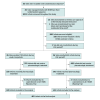Influence of Eat, Sleep, and Console on Infants Pharmacologically Treated for Opioid Withdrawal: A Post Hoc Subgroup Analysis of the ESC-NOW Randomized Clinical Trial
- PMID: 38619854
- PMCID: PMC11019446
- DOI: 10.1001/jamapediatrics.2024.0544
Influence of Eat, Sleep, and Console on Infants Pharmacologically Treated for Opioid Withdrawal: A Post Hoc Subgroup Analysis of the ESC-NOW Randomized Clinical Trial
Abstract
Importance: The function-based eat, sleep, console (ESC) care approach substantially reduces the proportion of infants who receive pharmacologic treatment for neonatal opioid withdrawal syndrome (NOWS). This reduction has led to concerns for increased postnatal opioid exposure in infants who receive pharmacologic treatment. However, the effect of the ESC care approach on hospital outcomes for infants pharmacologically treated for NOWS is currently unknown.
Objective: To evaluate differences in opioid exposure and total length of hospital stay (LOS) for pharmacologically treated infants managed with the ESC care approach vs usual care with the Finnegan tool.
Design, setting, and participants: This post hoc subgroup analysis involved infants pharmacologically treated in ESC-NOW, a stepped-wedge cluster randomized clinical trial conducted at 26 US hospitals. Hospitals maintained pretrial practices for pharmacologic treatment, including opioid type, scheduled opioid dosing, and use of adjuvant medications. Infants were born at 36 weeks' gestation or later, had evidence of antenatal opioid exposure, and received opioid treatment for NOWS between September 2020 and March 2022. Data were analyzed from November 2022 to January 2024.
Exposure: Opioid treatment for NOWS and the ESC care approach.
Main outcomes and measures: For each outcome (total opioid exposure, peak opioid dose, time from birth to initiation of first opioid dose, length of opioid treatment, and LOS), we used generalized linear mixed models to adjust for the stepped-wedge design and maternal and infant characteristics.
Results: In the ESC-NOW trial, 463 of 1305 infants were pharmacologically treated (143/603 [23.7%] in the ESC care approach group and 320/702 [45.6%] in the usual care group). Mean total opioid exposure was lower in the ESC care approach group with an absolute difference of 4.1 morphine milligram equivalents per kilogram (MME/kg) (95% CI, 1.3-7.0) when compared with usual care (4.8 MME/kg vs 8.9 MME/kg, respectively; P = .001). Mean time from birth to initiation of pharmacologic treatment was 22.4 hours (95% CI, 7.1-37.7) longer with the ESC care approach vs usual care (75.4 vs 53.0 hours, respectively; P = .002). No significant difference in mean peak opioid dose was observed between groups (ESC care approach, 0.147 MME/kg, vs usual care, 0.126 MME/kg). The mean length of treatment was 6.3 days shorter (95% CI, 3.0-9.6) in the ESC care approach group vs usual care group (11.8 vs 18.1 days, respectively; P < .001), and mean LOS was 6.2 days shorter (95% CI, 3.0-9.4) with the ESC care approach than with usual care (16.7 vs 22.9 days, respectively; P < .001).
Conclusion and relevance: When compared with usual care, the ESC care approach was associated with less opioid exposure and shorter LOS for infants pharmacologically treated for NOWS. The ESC care approach was not associated with a higher peak opioid dose, although pharmacologic treatment was typically initiated later.
Trial registration: ClinicalTrials.gov Identifier: NCT04057820.
Conflict of interest statement
Figures

References
-
- Agency for Healthcare Research and Quality . Healthcare Cost and Utilization Project (HCUP) Fast Stats. Updated December 2022. Accessed April 20, 2023. https://datatools.ahrq.gov/hcup-fast-stats/ - PubMed
-
- Finnegan LP, Kron RE, Connaughton JF, Emich JP. Assessment and treatment of abstinence in the infant of the drug-dependent mother. Int J Clin Pharmacol Biopharm. 1975;12(1-2):19-32. - PubMed
-
- Finnegan LP, Connaughton JF Jr, Kron RE, Emich JP. Neonatal abstinence syndrome: assessment and management. Addict Dis. 1975;2(1-2):141-158. - PubMed
Publication types
MeSH terms
Substances
Associated data
Grants and funding
LinkOut - more resources
Full Text Sources
Medical
Miscellaneous

